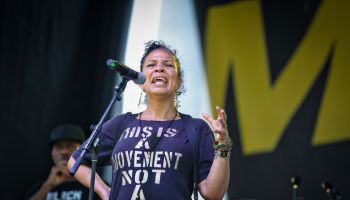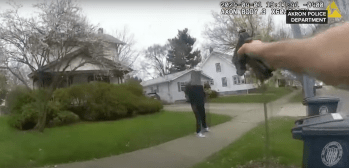 WASHINGTON (AP) — Mayor Vincent Gray often calls the District of Columbia “the envy of the nation” for its robust economy and fast-growing population, but some say the local government he leads – plagued by corruption, pay-to-play politics and disengaged voters – is a stain on the city’s progress.
WASHINGTON (AP) — Mayor Vincent Gray often calls the District of Columbia “the envy of the nation” for its robust economy and fast-growing population, but some say the local government he leads – plagued by corruption, pay-to-play politics and disengaged voters – is a stain on the city’s progress.
The latest bruise to the city’s reputation involves Gray, who is under federal investigation. Prosecutors say he knew about a $668,000 campaign slush fund that helped him get elected in 2010, and while Gray has not been charged, five people involved with his campaign have been convicted. Separately, three former members of the D.C. Council have pleaded guilty to felonies, including bribery and embezzlement, in less than 2 1/2 years.
The district is far from unique among cities that have suffered through a spate of criminal activity, alleged or otherwise, but the recent crimes are unprecedented for the local government.
Some believe corruption has been enabled in part because many residents maintain political loyalties elsewhere or pay closer attention to the federal government, the city’s largest employer.
“We suffer the serious handicap of a citizen base that is only marginally invested in our success,” said Johnny Allem, a 40-year veteran of city politics who worked as a spokesman for former Mayor Marion Barry, who was elected to a fourth term in the mid-1990s despite a drug conviction. “Too many of our residents and citizens consider themselves travelers passing through.”
Ron Faucheux, a veteran Washington-based pollster and the president of Clarus Research Group, said: “You have some people who make a living off of politics who live in Washington, D.C., and can’t name their own member of the city council.”
For those paying attention, there’s plenty to gawk at.
On Jan. 1, 2011, the day Gray was sworn in, Kwame Brown took office as D.C. Council chairman, Councilmember Harry Thomas Jr. began a second term and Michael A. Brown was halfway through his term as an at-large councilmember.
Three years later, Thomas and both Browns – who are unrelated – are gone. Kwame Brown pleaded guilty to bank fraud and resigned. Michael Brown admitted to taking bribes from undercover agents posing as businessmen seeking city contracts, and Thomas embezzled more than $350,000 in city money intended for youth programs.
“There’s no evidence that Washington, D.C., is more corrupt than other major American cities,” said Mark Rom, a Georgetown University political scientist.
Corruption, he said, is often “invisible, so we don’t really know how much is going on in different places before it gets exposed.”
Just last month, former New Orleans mayor Ray Nagin was convicted on 20 corruption charges, and last fall, former Detroit mayor Kwame Kilpatrick was sentenced to 28 years in prison for corruption.
But those cities aren’t under the thumb of Congress, which has the final say over Washington’s budget and laws. City residents only gained the right to elect their mayor and council in 1973, and some say the city’s fight for greater local autonomy and voting representation in Congress has been hurt by the failures of local leaders.
Last year, Rep. John Mica, R-Fla., compared the district’s requests for greater autonomy to teenagers seeking more spending money from parents. Mica chairs a House subcommittee that oversees district government.
The latest trouble has opened up the district to mockery once again, much as Barry did when he was videotaped smoking crack cocaine in an FBI sting operation in 1990.
Barry’s first three terms, from 1979-1991, were plagued by financial problems and a struggle to deliver basic services. His predecessor, Sharon Pratt, struggled to manage a government that had become bloated, resulting in historic deficits. Shortly after Barry returned to office in 1995, Congress stripped him of most of his powers and put a control board in charge of the city’s finances.
Since Barry’s tenure, the city has undergone a remarkable turnaround. Crime has plummeted, neighborhoods have been transformed and the city’s real estate market is booming. Buyers are snapping up multimillion-dollar condos in a glitzy downtown development called CityCenter. The city is gaining more than 1,000 new residents a month, according to Census figures.
On Wednesday, developers gathered with Gray and other elected officials to cut the ribbon on a massive project to transform the city’s Southwest Waterfront into a boardwalk with apartments, hotels and offices.
“There’s almost a surreal quality to the fact that the district is doing very well, while city hall continues to have this cloud,” said D.C. Council Chairman Phil Mendelson, who was elevated to the chairmanship when Kwame Brown resigned.
In Gray’s case, U.S. Attorney Ronald Machen has said only that those already charged represent “the tip of the iceberg.” The man who admitted funding what prosecutors called Gray’s “shadow campaign” was Jeffrey Thompson, an influential businessman. He owned a firm that held the largest contract in city government, worth more than $300 million annually, to manage the care of Medicaid recipients.
Gray has acknowledged that Thompson supported his campaign because he was worried about the future of his government contracts if then-mayor Adrian Fenty was re-elected. Critics say that kind of horse-trading is altogether too common.
Tom Davis, a former Republican congressman from northern Virginia and an advocate for district voting rights, said corruption doesn’t help the city’s case for autonomy. He said citizens must hold elected officials accountable.
“The voters have not seemed to care in the past,” Davis said. “We’ll see what happens in the mayor’s race.”
Spate Of Corruption Stains Otherwise Thriving DC was originally published on newsone.com















